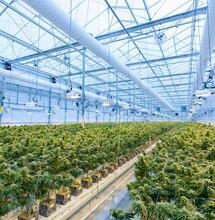_0.jpg)
Matthias Ghidossi from Swiss Cannabinoid is the father of Matternhorn and a precursor student of bivarine cannabis plants. In recent years he has accustomed us to important botanical developments in the field of cannabinoid research. For this reason we contacted him curious about his most recent research. Here's what emerged from our interview…
SSUK: What were the main research areas you focused on in the last year?
First of all we continued the work on CBG and so, recently, we launched Bubba G. Then I continued the breeding on genetic lines in the bivarine family, for which I see a good future and, in particular, for CBDV. In fact, this cannabinoid is not as dominant as CBG and therefore it is easy to create varieties with two cannabinoids, CBDV and CBD.
SSUK: So what would be the benefit?
This is an important aspect for those who make biomass because having two cannabinoids in their product represents an added value and gives the possibility of asking for a higher price at the sale. But it is equally important for those who take cannabis for health problems. In fact, by taking two cannabinoids, the effects are amplified in a sort of "entourage" effect.
SSUK: We know that you have opened collaborations overseas, can you give us any news?
My work with CBDV has helped Clay, a breeder who lives in southern Oregon that I met on one of my trips to the US before the pandemic, and a collective of American breeders who, together with Clay himself, Nick, breeder of Hokuseed and other breeders of opensourcegenetics, have contributed to the creation of Bubba's Quad Kush, a revolutionary variety with four cannabinoids. The strain in question has a ratio of 1.1.1.1 and contains CBD, CBDV, THC and THCV. Finally, this year should be the year of selection of the CBC [Ed. Cannabichromene].

SSUK: In terms of development and genetic improvement, what were the greatest satisfactions obtained?
Definitely having brought the right terpene, the one that was missing, into the CBG varieties. In Bubba G, in fact, there are improvements compared to Matterhorn and I'm talking about the terpenic profile, but also about the compactness of the flower. This plant in fact produces more than the Matterhorn and tends to grow more squat. We were also satisfied with Elisir as it is a very robust and productive plant as well as being innovative due to the presence of CBDV.
SSUK: Are you working on anything new for 2024?
If the tests give the desired results, next year other interesting varieties will come out such as: Cannatonic, CBG version, Strawberry CBG and other crosses.
SSUK: How do you judge the development of the seed market?
The seed market is always in constant evolution: if you stop, they cut you off, exactly as with the flower market which has changed its dynamics very quickly. After the various problems that developed in 2022 regarding viruses, especially the Hop latent viroid (HpLVd), the direction of the companies is to offer seeds free from any virus that could cause serious problems for producers. Luckily, there are tests that can be done to check if plants or seeds are infected. In fact, hemp can carry more than ten different viruses that can also infest other plants. Being contaminated is very easy, an infected scissor or an insect that comes from an infected plant are enough.
SSUK: What do you think about the hemp variety registration system in Europe?
Hemp variety registration is a joke. Especially in Europe where, since the CBD phenomenon started, growers have been buying seeds not included in the list. The gap between the listed and unregistered strains is huge and this is also due to the fact that the registration process is slow. It takes up two to three years for each variety and so by the time a new genetic is finally registered it is already old because during the registration process I may have developed new versions that make it obsolete.
Furthermore, it seems to me that the recordings go at different speeds: they recently refused me a variety even with the excuse that the leaves of the plants were not homogeneous with each other. I challenge anyone to plant industrial varieties included in the list that have a homogeneity that only stable hybrids can give. We all know that industrial varieties are not at all stable as varieties in the seventh generation and beyond can be.

SSUK: Why do you think this modus operandi is so harmful?
I believe that my work should be affordable and accessible to everyone and therefore new strains with selected new cannabinoids should be affordable and accessible quickly, not after three years of paperwork.
SSUK: How do you think the sector will evolve in the coming years?
We are in a new era. For years, we have seen more and more hemp-based products on the market. The CBD boom has made people realize what cannabis is. We are now at the next step (due to a logic of market saturation) which leads companies to reinvent themselves a new niche in the sector or to resume previously abandoned paths. I see a bright future for the building insulation market and for hemp bricks, for which, even before the CBD, things were moving, but with still very expensive prices compared to conventional materials.
The cosmetics sector should also have a good evolution: we can already see hemp-based products of major global brands, which was still unthinkable five years ago. I also hope the hemp-based food sector evolves, even if here the legislators have made some mistakes by setting a few PPM of the psychoactive substance as a THC limit.
SSUK: And looking into Europe across the border?
The truth is that we are all waiting to be able to cultivate our plants as Germany seems to have recently decided to do with a new law. In Switzerland we wanted to start a study by supplying cannabis to a few hundred people through pharmacies, to see if regulating the market was feasible. But do they really mean that after years of regulation in Canada and the USA there isn't enough scientific literature to illustrate how cannabis isn't as bad as it is portrayed?
We are talking about a substance that has been clinically demonstrated to have benefits for various pathologies and, not surprisingly, its medicinal use is permitted in many countries. Precisely for these reasons it is an aberration to carry out a further study if the substance is already used as a medicine.
SSUK: Looking back on the last five years, what do you think about what we've been through?
I think we've had quite a revolution with the rise of CBD, but that's just the beginning. I have seen a lot of people (external or even against hemp) having to change their mind, because CBD works for various problems, and has no particularly significant side effects. I think this revolution has brought a lot of information and this phenomenon will sooner or later also lead to a regulated market for THC.
People know this plant better and better and today it is now difficult to deny the evidence by detractors. Another aspect that has evolved a lot is the presence of large companies (even listed on the stock exchange) which, however, have to review their strategic plans. In the US the process has already begun, which will also come to us.
In essence, there are leading companies that are struggling to make ends meet. For example, a company in Canada recently shut down one of its indoor manufacturing sites, laying off 800 employees in one fell swoop. Many companies have to review their strategies as the market is constantly changing. Being then "global" prices tend and will always tend downwards. Finally, calculating the constant overproduction and the trend of the world economy over the past three years, I believe that this sector too will grow more slowly.
To discover the work of Swiss Cannabinoid : https://swisscannabinoid.ch/



